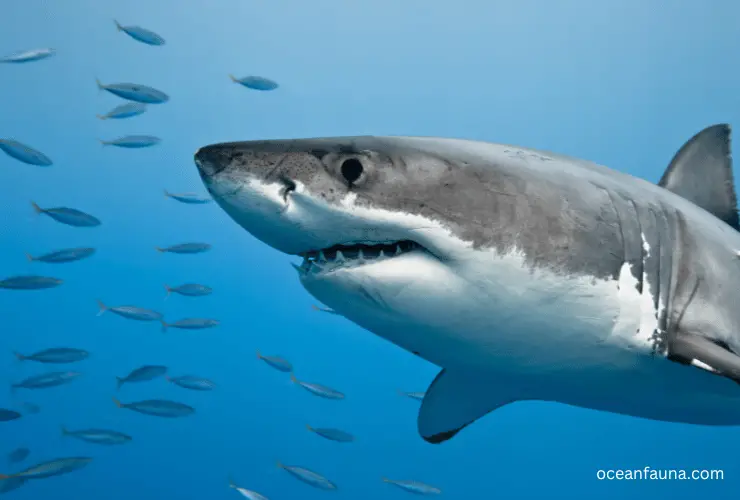Sharks are formidable predators in the underwater realm. Do sharks make noise in the deep ocean?
Indeed, they can make a wide array of noises, including barks, growls, clicks, and sometimes even musical notes. However, due to the absence of vocal cords, sharks are unable to produce vocal sounds.
In this article, I will inform you about the noises made by sharks and what type of communication they might be sending.
Do Sharks Make Noise?
If you ask whether sharks produce vocal sounds, then it is a big no. Despite their predatory prowess, sharks are incapable of verbal communication. Unlike most other animals, sharks lack vocal cords responsible for producing vocal sounds. As a result, sharks cannot create sounds using the traditional methods that most other animals use.
However, this does not mean that sharks are completely silent creatures. Although they cannot produce vocal sounds, they can emit a wide range of noises, including barks, growls, clicks, and even musical notes.
These sounds are produced by various methods, such as body movement, muscle contractions, and specialized organs, and can be heard up to several hundred meters away.

Some shark species, like the great white shark and tiger shark, are known to produce a variety of noises, such as barks, growls, and clicks.
Barks are one of the most common sounds produced by sharks. These sounds are often heard when sharks are in a feeding frenzy or during courtship rituals. Barks are produced by the shark’s jaws snapping shut, causing a loud sound to reverberate throughout the water.
Growls are another type of sound produced by sharks. These sounds are generally produced in response to a threat or when the shark is agitated. Growls are believed to be a warning to potential predators or competitors.
Clicks are also commonly produced by sharks and are often associated with their hunting behavior. The shark’s jaw muscles produce these sounds as they snap their jaws shut. Sharks use these clicks to locate their prey and are known to be especially sensitive to the sounds of wounded or distressed animals.
Some sharks also produce musical notes, which are believed to be produced by the shark’s swim bladder. These sounds are often high-pitched and have been described as sounding like a violin or a cello. However, not all shark species are capable of producing musical notes.
How Do Sharks Make Noise?
Sharks are fascinating creatures known for their fearsome appearance and impressive hunting skills. Although they do not have vocal cords like most animals, sharks can still make noise in various ways. Here are the details of sharks’ different methods and organs to generate sound.
Body Movement
One of the most common ways that sharks make noise is through body movement. As they swim, sharks generate a series of thumps and bumps that can be detected by other animals in the water.
This is largely due to the shape of their bodies, which are designed to minimize water resistance and maximize speed. As sharks move through the water, their fins and tail generate a series of vibrations that other animals can hear.
Jaw Snapping
Another method that sharks use to make noise is jaw snapping. This is particularly common in species like the great white shark, which have incredibly strong jaws that allow them to bite through tough prey.
When these sharks snap their jaws shut, they generate a loud popping sound that other sharks in the area can hear. This sound is thought to serve as a warning to other animals to stay away.
Swim Bladder
Some sharks are able to generate sound using a specialized organ called the swim bladder. This is a gas-filled chamber that is found in many fish species, and it is used to regulate buoyancy.
In some shark species, the swim bladder is modified to act as a sound-producing organ. By rapidly contracting the swim bladder muscles, sharks can generate a series of grunting and croaking noises that other animals can hear.
Other Specialized Organs
In addition to the swim bladder, some sharks have other specialized organs that are used to generate sound. For example, the lemon shark has a pair of muscles called the sonic muscles that are used to produce a low-pitched hum. This sound is thought to be used in communication between individuals and may also play a role in prey detection.
Which Sharks Make Noise Most?

Despite the fact that sharks are typically not known for producing vocal sounds, certain species have been observed making noise through various means. While some sharks are relatively silent, others are capable of generating an impressive range of sounds that they use for a range of purposes.
One of the most audible sharks is the great white shark. Though it lacks vocal cords, it can create deep growling sounds by grinding its teeth together. This behavior is especially pronounced during mating season in the waters off the coast of California, where the low-frequency growls can be heard up to a mile away.
Tiger sharks are another type of shark that is known to produce sound through body movement. They can produce various noises, including barks, grunts, and even coughs, in the same way that great white sharks produce low-frequency growls.
Hammerhead sharks, while less vocal than some other species, still make sound with the help of their swim bladders. The air-filled bladder in the shark’s abdomen can vibrate to produce a musical sound that helps the hammerhead communicate with other sharks.
In other sharks, like the draughtsboard shark, drumming sounds can be produced by the contraction of the muscles in their swim bladder cavity.
Overall, it is difficult to determine which shark makes the most noise as the ability to generate sound varies from one species to another. However, it is clear that certain species, such as the great white and tiger sharks, are more audible than others.
Further research will undoubtedly reveal even more fascinating ways in which sharks communicate through sound and body movement.
Which Sharks Don’t Make Noise?
As you know now, all sharks lack vocal cords, meaning they cannot produce any vocal sounds. Instead, they produce sound by using their body parts, such as their teeth or the movement of their fins. However, not all species of sharks produce sound in this manner.
When it comes to the whale shark, which is the largest shark species in the world, it is considered to be a silent hunter. This means that it does not produce any sounds while hunting or interacting with its environment. Unlike other sharks, whale sharks do not have any specialized organs or structures for producing sound.
One reason behind this silence could be the whale shark’s feeding behavior. These sharks are filter feeders and primarily feed on plankton, small fish, and squid.
They do not need to use sound to locate prey; they simply swim with their mouths open and filter out their food. In addition, being a relatively slow swimmer, producing sound could potentially alert other predators to their presence, making them vulnerable to attack.
In terms of communication, it is not known if whale sharks use any other methods to communicate with each other. However, some studies suggest that they may use body language or chemical signals to communicate with conspecifics.
Why Do Sharks Make Noise?

Sharks cannot produce vocal sounds like other animals due to the absence of vocal cords. However, they are known to communicate with each other using a variety of non-verbal communication methods, such as body language.
Yet, scientists have observed sharks producing sounds that have a crucial role to play in their communication, navigation, and hunting. Here various reasons are discussed below why sharks make noise.
Communication
Sharks may use sound to communicate with each other. They can alert each other of nearby prey or potential predators by producing low-frequency calls or vibrations. Scientists believe that some species of sharks also produce sounds during elaborate courtship rituals. For instance, male smooth-hound sharks emit a low hum to attract female sharks during mating.
Navigation
Sharks use their unique sense of hearing to locate prey, navigate through their environments, and identify potential threats. Many sharks are known to detect sound vibrations from great distances. For example, hammerhead sharks have a unique head shape that helps amplify the sound waves in the water and locate prey accurately.
Mating
Sound production is an essential component of shark mating behavior. Different species may use different sounds to attract mates or establish dominance. For instance, male lemon sharks use specific sounds to signal their readiness to mate. The female sharks can perceive these sounds and swim toward the males to mate.
Defence Mechanism
Some species of sharks produce sounds as a defense mechanism against predators or to scare off potential threats. For example, the blacktip shark produces a barking sound that repels predators and deters them from attacking.
FAQs
What kind of noise do sharks make?
Sharks are fascinating creatures that are known for their ability to emit a wide range of noises, including barks, growls, clicks, and even musical notes. These sounds are produced by the shark’s body, specifically by its organs, muscles, and movement through the water.
Unlike most animals, sharks do not possess vocal cords, meaning their sound production differs from that of mammals and other vertebrates.
Shark sounds are primarily used for communication, navigation, and hunting. For example, clicking sounds are used by some species, such as the hammerhead shark, to locate their prey using electroreception. Meanwhile, barking and growling sounds are often used as displays of aggression by certain species of sharks.
Additionally, sharks are known to produce complex sequences of noises, such as musical notes, during courtship and mating.
Each species of shark has its unique sound production capabilities. For instance, larger sharks tend to produce deeper and louder sounds, while smaller species emit higher-pitched noises.
Some sharks can also produce infrasonic sounds, which are below the range of human hearing. These sounds are thought to be used for long-distance communication, as they can travel much farther through water than higher-frequency sounds.
Do sharks have vocal cords?
No, sharks don’t have vocal cords. That’s why they are unable to make vocal sounds. Vocal cords are responsible for producing and controlling the sound of speech and other vocalizations in other animals.
Sharks, on the other hand, use a combination of body language and electroreception to communicate with each other.
Electroreception works by using special receptors called ampullae of Lorenzini that detect electrical signals emitted by other animals, enabling sharks to sense their presence even from a distance.
Therefore, while they may not have vocal cords, sharks have evolved other communication methods, which have proved to be just as effective in their underwater environment.
Conclusion
Now, you comprehensively understand the various sounds that sharks produce without vocal cords. Each sound is generated distinctly and serves a unique purpose. However, for a more in-depth comprehension of shark vocalizations, it is advisable to consult a shark expert.

